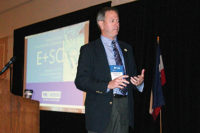Starkville is a college town, and on a warm, sunny weekend in March it was Super Bulldog Weekend that brought out Mississippi State University alumni and students — along with most of the townfolk — for sports events, concerts, cookouts, pub hopping, and fraternity parties.
Amidst all this delightful chaos, some three-dozen hvacr technicians from Mississippi, Alabama, and Tennessee were in town for several days as part of the eighth annual Southeast Regional Association Conference of the Refrigeration Service Engineers Society (RSES).
TECHNICAL TALK
Technical sessions covered compressors, refrigerants, ice machines, heat pumps, natural gas, and pipe sizing.John Burnett of Copeland discussed the causes of compressor failures. “Over 50% of in-warranty electrical failures are caused by mechanical failures,” he said. “And over 60% of in-warranty mechanical failures are caused by system problems.”
In fact, he said technicians are often too quick to condemn the compressor before performing a complete analysis. He said 30% of compressors returned to Cope-land from the field have nothing wrong with them.
Causes of mechanical compressor failures can be traced, he said, to refrigerant floodback, flooded starts, slugging, compressor overheating, and loss of oil.
He noted that floodback can be attributed to improper charges, a sudden change in load, and low evaporator loads, among other possibilities.
Flooded starts relate to refrigerant migration. He said, “Refrig-erant migration occurs anytime refrigerant and oil are in contact with each other and the compressor is not operating.”
In air-cooled compressors, floodback causes slugging; in refrigerant-cooled compressors, migration causing the slugging.
Causes of overheating include high compression ratios, high return gas temperature, and lack of external cooling. One simple aspect of the oil issue is that the oil returning must equal the oil leaving.
Much of a presentation by John Hallisey of Hughes Supply focused on the safety factor of newer refrigerant R-410A.
It was pointed out that the permissible exposure limit (PEL) for 410A is the same as R-22, so technicians comfortable with 22 should feel the same in respect to PEL when working with 410A.
Among items discussed:
When an audience is composed of service techs, the Catch-22 of some requirements is sure to be brought up. When it was noted that 410A cylinders should not be exposed to ambient temperatures above 125°F, several in the audience pointed out that the temperature in the storage area of service vans in the South in the summer can easily top that. Those in the seminar could only agree that it poses a problem.
The ice machine talk, from John Szybowicz of Scotsman, focused on new trends, including plug-ins for laptops used in troubleshooting and system diagnosis.
Szybowicz also said that 70% of ice machine problems are water related, 20% are electrical, and 10% can be traced to the mechanicals.
“The recipe for ice starts with a clean machine,” he said.
He noted that flaker problems are often caused by not cleaning the auger. “The auger must be free of scale,” he said. “A wet auger might appear to be OK; let it dry to see if there is scale.”
Taking Care of Business
In addition to the Southeast Regional Association, the conference had representation from the Alabama State and Volunteer State associations within RSES.The Alabama group accorded the Drexel Daily Award for outstanding service to Charles Davis. The volunteer association recognized James Flach as its Member of the Year.
Publication date: 05/07/2001






